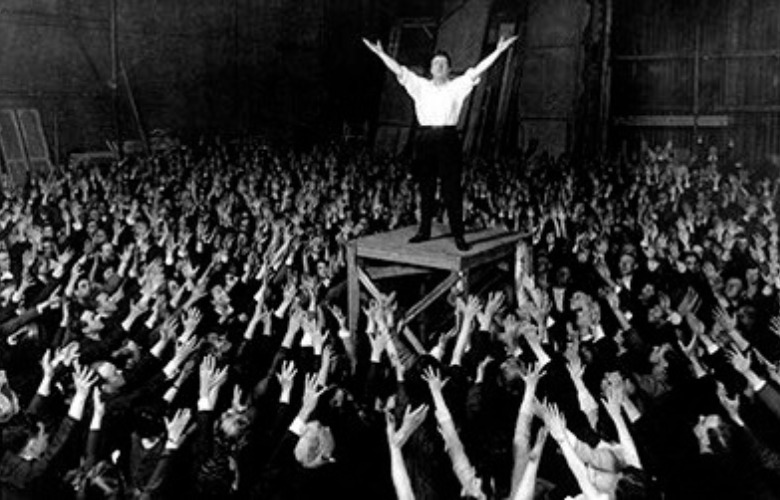
In this week’s article, I am publishing an essay I wrote several years ago about the establishment of Actors’ Equity, the labor union to help create better and more consistent working conditions, fair wages, and protections in work environments for actors and stage managers in theatrical settings. It seems quite fitting with a large part of America still struggling with fair wages and equitable working conditions.
Since the initiation of the Industrial Revolution in the late 1700s continuing into the nineteenth century, a rise of major tyrannical industrial, textile, and anti-union manufacturing companies created a new definition of labor. During the introduction of new technology and a need to fill positions to help operate heavy machinery, mass-produce through tedious tasks, and work against high demands for products, these companies dominated the workforce under their terms. Because of the changing economic climate due to the new industries brought on by the Industrial Revolution and in light of the large amounts of profits being brought in domestically and internationally, the common worker—not well paid—had a dependable job and actively sought to have better rights for their time and skills. Employees made demands from employers to offer a fair wage. The formation of organized labor unions forced employers to bring production lines to a halt, and close their warehouses for days, sometimes weeks, due to strikes such as the miners’ strike in Pennsylvania or the women’s phone operators strike in New England refusing to work under strict conditions with no breaks and long working hours.
Not unlike these industrial workers’ unions, a need for recognition, fair treatment, and working conditions was also present for professional theatre actors. Specifically in New York City, where most of the actors worked in the early 1900s, they experienced similar types of unfair treatment in the form of unpaid rehearsal time lasting an undefined amount of time before a performance and with no guarantee of performances. These disadvantages caused one hundred and twelve professional actors to formalize a strike against the managers of over forty productions. Today, there is a similar problem in certain areas of the country even with a well-established actors’ union. In some cases, professional theatre actors willingly subject themselves to their own unfair treatment, which was fought against in the Strike of 1919.
In this essay, I explore how the evolving theatre market and the way people view theatre affects the Actors’ Equity Association, its implementation of new policies, and its support to actors in such a diverse theatre market. I argue the Actors’ Equity Association aids in the growth of theatre with its historical clout, its homage traditional theatre, and its flexibility for new emerging forms of theatre in today’s modern society.
In May 1913, the Actors’ Equity Association (A.E.A.) was formed by 112 New York actors standing up for their right to a fair wage and to be treated as professionals. “For several years the actors used only the method of argument,”[1] and it was this form of unprotected, every-man-for-himself routine producers and managers were abusing to save every penny they could by demanding rehearsal without pay for as long as thirteen weeks. Now, this implementation of an Equity contract was no easy task. Mr. Shubert declared publicly, “The scheme is as impracticable as the actor himself” and Mr. William A. Brady even claimed, “Your A.E.A contract is absolutely fair, but I’ll never adopt it until I am forced to.”[2] The members of Equity fought and petitioned for the recognition of the union for six years and were not able to achieve much of anything. In response to the continued neglect of their actors’ union, the members were outraged by their unfair treatment and often-poor conditions; they went on strike in 1919. The Strike of 1919, which lasted for nearly two months “closed 37 plays and prevented 16 additional productions from opening.”[3] In days before Equity, producers could withdraw a show at any time and the actors would be thrown suddenly out of work with no notice.[4] The union had a lot to live up to and a lot to prove for what it aimed to enforce on the producers. After gaining recognition of their union from their nearly two-month strike, it wasn’t anything but an uphill battle to get the managers to conform to their new status as professionally recognized and represented actors. Once the union was finally recognized and respected, its benefits sang loud for decades and is a force, which helps keep actors and stage managers well-respected and paid in their careers.
Along with the union’s long-standing history with helping support actors, it also promotes continued growth in the theatre with the homage it has towards more traditional types of theatre. The A.E.A. recognizes three major types of with whom they offer Equity contracts. First is the League of Resident Theatres (L.O.R.T.), which is then divided into four other categories (D, C, B, A) based on the size of the theatre. L.O.R.T. theatres all have a separate tier; based on which category they are in, they must abide by the minimum wage set by their LORT/Equity contract and provide housing among other requirements, which must be met to carry a contract with Equity. L.O.R.T. theatres are the largest type of professional theatres in the nation, paying some of the highest wages of up to $1,000 per week plus housing and in some cases per diem. Many of these theatres prominently showcase classical plays, Shakespearean plays, and older American plays. During rehearsal periods, the cast members and stage manager elect an Equity Deputy who is the direct contact with the union to inform the union of any issues or questions that may arise during the production. Equity takes pride in being able to protect its members; this is one of the many ways they effectively enforce its policies to ensure all are treated as fairly as possible across the board.
More and more, theatre practitioners are exploring new ways to make theatre. Developmental theatre refers to theatre that is “still in development.” This type of work requires a group of actors that can be flexible and can work without a script at times and to build a piece strictly off of a collection of photos and movement. Some playwrights and directors write the play as rehearsal progresses, taking moments and pieces out of rehearsal to inspire the text of the play. Likewise, other directors, designers, and playwrights are constantly exploring new ways to see the world through texts already present and interpreting them into a new way to evoke new thought under a different design concept in line with the text of the play. Productions operating in an experimental atmosphere may be trying things and exploring new possibilities over and over and over again, extending rehearsal periods. Most of the time, these types of theatre are hosted in smaller theatres due to their avant-garde nature, but are not always small, and do have special contracts to deal with longer rehearsal periods. Some of these smaller theatres are as small as 49 seats, like the ones in Los Angeles, which have a special LA 99 Seat contract, which provides minimal provisions for actors and managers, but is a way to hire Equity actors who are seeking ways to promote themselves to film and television producers in the industry there. Although these new contracts do not cover all of the issues present today, obviously, Equity provides proactive responses to an ever-changing theatre market by using its historical clout, paying homage to its roots, and being flexible with these new forms of professional theatre. Equity understands the actors’ needs and they act on making their environment as comfortable as possible with a fair wage and treatment across the board. The Strike of 1919 was not in vain and made huge strides to provide professional theatre actors with a Big Brother to watch their backs against managers. What will the next equivalent problem to issues related to the 1919 strike in the next generations of professional actors be and how will the union respond and provide assistance to its members?
Let’s have a conversation about what needs to change in our industry as Stage Managers for the better. We are the leaders, so the words we speak, and the actions we take matter.
[1] Gemmill, Paul F. Equity: The Actors’ Trade Union. Quarterly Journal of Economics Pg. 129-14.Print.
[2] Gemmill, Paul F. Equity: The Actors’ Trade Union.
[3] Baar, K. Kevin. What Has My Union Done For Me? Film History. Volume 20 pg 437-455, 2008. Print.
[4] Gemmil, Paul F. Equity: The Actors’ Trade Union.
Also by Bryan Runion:
Inviting Feedback, Encouraging Diversity and Challenging Tradition
Phases of Production: The Rehearsal Process as a Stage Manager


Bryan Runion is a professional Production Stage Manager whose credits include: Drawn to Life (Cirque du Soleil and Disney), Netflix’s Stranger Things: The Experience, Duel Reality (7 Fingers), La Perle (Dragone), The Voice of Tolerance (The Ministry of Education, UAE); Mastercard Experiences (Mastercard); Everybody Black (World Premiere), Queens (La Jolla Playhouse), Ken Ludwig’s The Gods of Comedy (The Old Globe), TEDx (Chula Vista), Mark Morris Dance Company, Joey Alexander Trio, Ukulele Orchestra of Great Britain (La Jolla Music Society), The Bridges of Madison County (Arkansas Rep). Bryan earn his M.F.A. at The University of California, San Diego and his B.A. at The University of Arkansas at Little Rock. He is a proud member of Actors’ Equity Association and The Stage Managers’ Association.
Read Full Profile© 2021 TheatreArtLife. All rights reserved.

Thank you so much for reading, but you have now reached your free article limit for this month.
Our contributors are currently writing more articles for you to enjoy.
To keep reading, all you have to do is become a subscriber and then you can read unlimited articles anytime.
Your investment will help us continue to ignite connections across the globe in live entertainment and build this community for industry professionals.